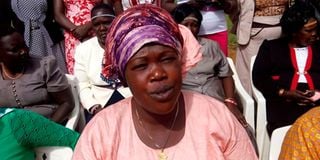Men pushed to back female candidates in 2022 election

Ms Emily Partany the community facilitator working with Kapenguria Theatre Organisation. She led a meeting in Kapenguria to push for more women to be elected in the forthcoming General Election.
What you need to know:
- Men in pastoralist communities have been challenged to support women to vie for leadership positions.
- Men keep women’s documents like voting cards and identity cards. Husbands always deny them their freedom in voting.
- Pokot Girl Child Network Director Teresa Lokichu said many women from pastoralist communities have not been given the opportunity to lead.
Men in pastoralist communities have been challenged to support women to vie for leadership positions.
Speaking during a women’s workshop in Kapenguria, the women said they ought to be taught about their rights during the fourth coming elections.
The women called on local MPs to support the two-thirds gender rule. They also cited challenges ranging from lack of money, illiteracy, and traditional beliefs that hinder women from vying for leadership positions.
They said men do not allow women to register as voters, and when they do, they command who the women should vote for. Others even want women to seek their permission before voting.
“Men keep women’s documents like voting cards and identity cards. Husbands always deny them their freedom to vote. Women said that their men fear women being free to join politics saying it can lead to prostitution,” said the community facilitator for Kapenguria Theatre Organisation Ms Emily Partany.
The meeting heard that women in the Pokot community are the ones taking care of everything in the homes, including building houses, thus it becomes hard for them to join politics.
Men control all wealth
“Women fear competing with men in the society thus, men sell property owned by women,” said Ms Partany, the women's leader.
They complained that men controlled all the wealth in their homes.
“We want men to respect our rights. We have suffered for a long time but the Constitution will save us,” she said.
Ms Partany said girls in the Pokot community have been denied education, but instead considered as wealth for their parents.
Pokot Girl Child Network Director Teresa Lokichu said many women from pastoralist communities have been denied the opportunity to lead.
Pokot women still face challenges including lack of education to cultural practices.
“Women should not only go for the women representative seat, but compete with men in other elective positions. Many only think of the women representative seat,” Ms Lokichu said.
She added that they would carry out sensitisation forums among women and the general public to have a changed mind set.
“Ms Lokichu reiterated that the media has only focused on issues of cattle rustling, hunger and other ills, forgetting to champion issues of women. She, however, urged women not to give up and vie for other elective positions. They called on the government to train and educate women from marginalised pastoral areas.
Pastoralist communities
“Next year, we shall move to every ward and we are sure many women will be elected. We have seen elected women supporting their fellow women,” said Ms Rael Lodia.
They cited discrimination against women in the region by the former regimes.
“We have been discriminated against since independence, but devolution has brought us to the lime light. We want more women to vie for governorship and senator positions. We urge Kenyans to elect women for development to be realised in the country,” said Ms Lodia.
They said many women in pastoralist communities are disadvantaged and marginalised.
“We want the Zebra formation where if a man is elected governor, a woman becomes his deputy and vice versa,” Ms Lodia noted.
“We shall carry out sensitisation meetings among women and the general public to have a changed mind-set,” reiterated Ms Lodia.
She urged political parties not to discriminate against women and called on the government to empower women so that they can have fair representation in leadership at the ward, county and national levels.





